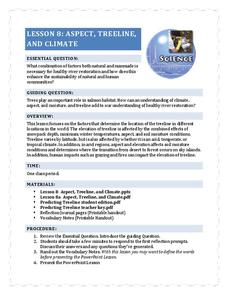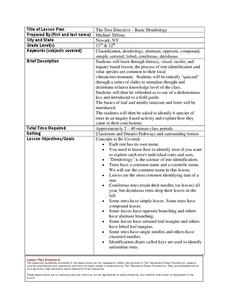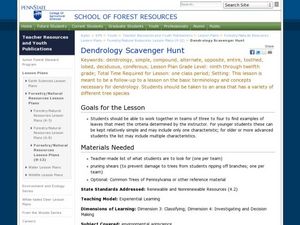Minnesota Department of Natural Resoures
Minnesota’s Forests
The forests of Minnesota provide middle schoolers with an integrated learning opportunity. They examine the three biomes and their histories, conduct experiments, read stories, and draw pictures. A lovely lesson plan about trees.
Biology Junction
Plant Diversity
Ginkgo trees existed for more than 350 million years, and, at this time, only one species still remains. While plant diversity generally increases over geologic time, some interesting exceptions occur. Young scientists learn about plant...
Curriculum Corner
Coniferous and Deciduous Trees
What are the differences between coniferous and deciduous trees? Supplement your tree lessons with a set of activities that has learners describing, naming, comparing, and reading about deciduous and coniferous trees. The activities are...
National Park Service
Aspect, Treeline, and Climate
Head to the treeline and beyond to examine how this feature of the landscape affects weather and climate, which gives scientists clues about its health. Class members' observations of photographs provide the data that drives the...
Science Education Resource Center
Compare and Contrast deciduous and evergreen tree leaves to aid in tree identification
Boost observational skills and get to know the difference between deciduous, coniferous, and evergreen trees with a lesson that challenges scholars to compare, contrast, identify, sort, and draw their findings.
Curated OER
Science: Schoolyard Trees
Sixth graders choose specific trees to research while taking a nature walk around the schoolyard. They discuss tree and leaf parts and observe various types of leaves. After writing their reports, 6th graders present them to the class...
Biology Junction
Seed Plants: Gymnosperms and Angiosperms
One of the reasons plants found success on land relates to seed development. Scholars learn about many different forms of seeds and how they changed over time. It describes the structure and function of many different types of seeds in...
Curated OER
Meet the Plants
Are you looking for a PowerPoint that identifies and explains the job each plant part performs? Perhaps you've found it! Examples of different types of plants, as well as common household items derived from plants are included. The text...
Curated OER
The Tree Detective - Basic Dendrology
Students identify tree species by their leaf characteristics. In this dendrology lesson plan, students learn leaf vocabulary and collect leaves. They identify the leaves using the leaf characteristics and the vocabulary that they learned.
Curated OER
Taiga
In this taiga worksheet, students read a short article describing what a taiga is and then answer 10 multiple choice, true or false or short answer questions relating to the article.
Curated OER
Community Tree Contest
Students observe trees in their neighborhood. They practice tree identification and incorporate math skills to determine the winner of a 'Tree-mendous Tree' contest in which they determine which is the biggest tree.
Curated OER
A Walk in the Woods
Eighth graders observe and identify the different levels of the forest. In this forest zones lesson students observe, identify and name a variety of forest components and describe how humans impact the forest ecosystem.
Curated OER
Tree Leaves: Determining the Characteristics They Share in Common
High schoolers use their basic knowledge of dendrology concepts and terms. In this tree leaf instructional activity students divide into groups and determine which characteristics go with what plant.
Curated OER
Dendrology Scavenger Hunt
Students examine leaves that are assigned to them. In this earth science lesson students work in groups and find examples of leaves that the instructor asks for.
Curated OER
Plants
In this plants activity, students review the alternation of generations in plants and the function of seeds and flowers for plants. This activity has 11 short answer questions and 4 fill in the blank questions.
Curated OER
Dichotomous Key for Identifying Pine Trees
Pupils identify the species of pine trees that are found in their area. They use unlabeled "mystery" samples and a dichotomous key to identify the pine trees to species. After identification, they use a field guide to answer worksheet...
Curated OER
Tree Identification
In this tree identification worksheet, students collect samples from different trees and identify them using the deciduous tree guide or the conifer key.
Curated OER
Evergreen Trees & Softwood
For this earth science worksheet, students identify and locate various vocabulary terms pertaining to evergreen trees and other softwood trees. There are 26 earth science terms located in the word search.
Curated OER
Ecology: Trees
Fourth graders read the defintions of renewale and nonrenewable resources and discuss any incorrect responses. They view a sample of work for the class to see which they describe posting responses on the board in their respective columns...
Curated OER
Science: Vocabulary Memory Game
Fourth graders increase their comprehension of science terms by playing a vocabulary matching game. In small groups, they take turns trying to match vocabulary terms with the correct definitions. Missed words are added to the students'...
Curated OER
Ecological Citizen
Students examine the interconnectedness of living and non-living things that constitute an ecosystem. They examine fallen trees,insects, living trees, leaves, food webs, and forests. They conduct various activities and write poems about...
Missouri Botanical Garden
Missouri Botanical Garden: The Taiga Biome
This resource offers a detailed overview of the taiga biome, including its locations, the types of plants and animals that live there, and other interesting facts.
Environmental Education for Kids
Eek!: Evergreens
Site chronicles Wisconsin's Evergreen and Conifer trees. There are descriptions of the various tree types. Additionally, site details the uses of these trees in nature. Ideal for grades 4-8.
Alberta Online Encyclopedia
Alberta Online Encyclopedia: The Boreal Forest
The Boreal Forest region of Alberta, Canada is featured in this effective site. The topography and types of trees found in this area are identified. A brief portion of this site is devoted to the impact of forest fires on flora and fauna...
























